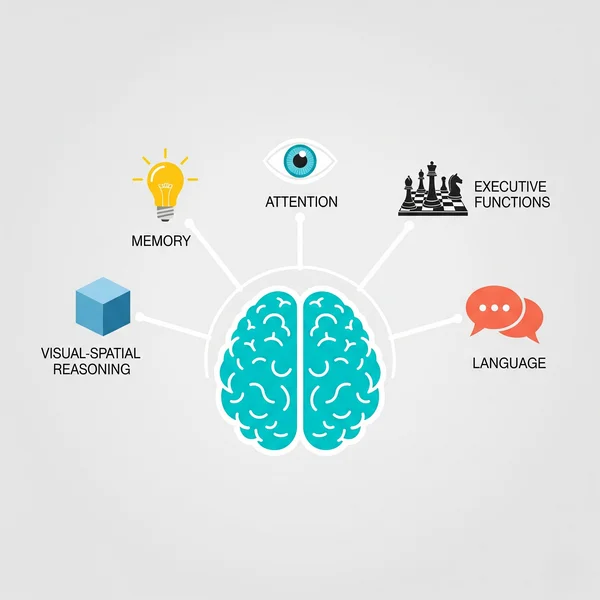What Is a Cognitive Test? A Complete Beginner's Guide
July 6, 2025 | By Audrey Fletcher
Have you ever heard the term "cognitive test" and wondered what it truly means? Perhaps you've seen it mentioned in a news article, by a doctor, or in a job description. You're not alone. In a world increasingly focused on mental wellness and brain health, understanding these assessments is more important than ever. So, what does a cognitive test consist of? This guide will break it down for you, explaining everything from its core purpose to the specific skills it measures. Ready to demystify the world of cognitive assessments? You can even start to explore your own cognitive profile by trying a comprehensive cognitive assessment on our platform.

Defining the Cognitive Test: More Than Just a Quiz
First, let's be clear: a cognitive test is not your average online quiz. It's a structured, standardized method of measuring an individual's mental capabilities across various domains. Think of it as a systematic check-up for your brain's performance. Based on decades of research in psychology and neuroscience, these assessments are designed to objectively evaluate your cognitive function, giving you a snapshot of your mental sharpness and efficiency. Unlike a trivia quiz that tests what you know, a cognitive test evaluates how you think, remember, reason, and solve problems.
The Core Purpose of Cognitive Testing
So, why would someone need cognitive testing? The applications are broad and incredibly valuable, serving different purposes for different people.
For Personal Cognitive Health Monitoring
Many adults and seniors use cognitive tests to proactively track their brain health over time. It provides a baseline to monitor for any changes in mental sharpness, helping you stay on top of your cognitive well-being, much like you would monitor blood pressure or cholesterol.
In Clinical and Healthcare Settings
Healthcare professionals may use these assessments as part of a larger evaluation to screen for cognitive impairments. While they are not a diagnosis on their own, they provide valuable data to help guide further medical investigation.
For Academic and Professional Assessment
Educators and employers often use a form of cognitive ability test to understand a student's learning profile or to evaluate a candidate's suitability for a role that requires strong problem-solving and decision-making skills.
What Does a Cognitive Test Consist Of? Key Domains Assessed
Here's where it gets interesting. A comprehensive cognitive test doesn't just give you a single score; it breaks down your performance into several key areas. This detailed feedback is crucial for understanding your unique cognitive strengths and weaknesses. The online cognitive test on our platform is specifically designed to measure these core domains:

Memory: Recalling and Retaining Information
This assesses your ability to learn new information and recall it later. It can involve remembering lists of words, patterns, or details from a story. Strong memory is fundamental to learning and daily functioning.
Attention: The Ability to Focus and Filter
How well can you concentrate on a task while ignoring distractions? This domain measures sustained attention (staying focused over time) and selective attention (focusing on relevant information).
Executive Functions: Planning, Switching, and Problem-Solving
This is your brain's "CEO." Executive functions are a set of higher-level skills that include planning, organizing, switching between tasks, and inhibiting impulsive responses. They are critical for achieving goals and adapting to new situations.
Language Skills: Understanding and Expressing
This evaluates your ability to comprehend written and spoken language, as well as your ability to express your thoughts clearly.
Visual-Spatial Reasoning: Navigating Your World
This domain tests your ability to perceive, analyze, and manipulate objects in your mind. It's the skill that helps you read a map, assemble furniture, or arrange items in a limited space.
Common Types of Cognitive Tests You Might Encounter
You might hear about different kinds of cognitive assessments, and they generally fall into two categories.
Screening Tools (e.g., MoCA, MMSE)
These are typically short, paper-based tests administered by a professional, designed to quickly screen for significant cognitive issues. They are excellent for clinical settings but may not offer the detailed, multi-dimensional feedback many users seek.
Comprehensive Digital Assessments (like ours!)
Modern platforms, like ours, offer a more detailed and engaging experience. A digital Cognitive Test can provide instant, automated scoring and a detailed report across multiple domains, making it a powerful tool for personal insight and cognitive health management.
Who Benefits from Taking a Cognitive Test?
The short answer is: almost everyone. Who benefits from a cognitive test? Let's look at a few examples:
Adults and Seniors Proactively Managing Health
Gaining a baseline of your cognitive function can empower you to make lifestyle changes and track your brain health as you age.
Students and Educators Identifying Learning Profiles
Understanding cognitive strengths and weaknesses can help tailor learning strategies for students, improving academic performance.
Professionals in High-Demand Roles
For those in fields requiring high mental sharpness, regular cognitive assessment can be a tool for maintaining peak performance.

Your Next Step: From Understanding to Action
Recap: What We've Learned
A cognitive test is a powerful, science-backed tool for evaluating key brain functions like memory, attention, and problem-solving. It's far more than a quiz—it's a window into your mental performance, offering valuable insights for personal health, academic success, and professional development.
Take Our Comprehensive Cognitive Test Online
Now that you understand the "what" and "why," it's time to experience it for yourself. Learning about your cognitive profile is the first step toward nurturing your brain health for years to come. Click here to start your cognitive test journey!
Frequently Asked Questions about Cognitive Tests
Here are answers to a few more common questions we receive.
What are some typical questions on a cognitive test?
Typical tasks might include remembering a sequence of numbers (testing memory), quickly identifying a specific shape among distractors (testing attention), or figuring out the next item in a logical pattern (testing executive function). The challenges are designed to be engaging and measure specific cognitive skills. You can see examples when you try our cognitive test.
Is a cognitive test the same as an IQ test?
No, they are different. While there is some overlap, IQ tests are designed to measure a person's general intellectual potential and provide a single score. A cognitive test, on the other hand, focuses on evaluating specific cognitive functions and provides a profile of individual strengths and weaknesses, which is often more practical for understanding and improving your mental performance.
Can I "fail" a cognitive test?
You can't "pass" or "fail" a cognitive test in the traditional sense. The goal isn't to get a perfect score. Instead, the results provide a personalized snapshot of your current abilities. This information is a tool for self-awareness and can help identify areas where you excel and areas you might want to support through training or lifestyle changes. The best way to understand it is to get your own cognitive report.